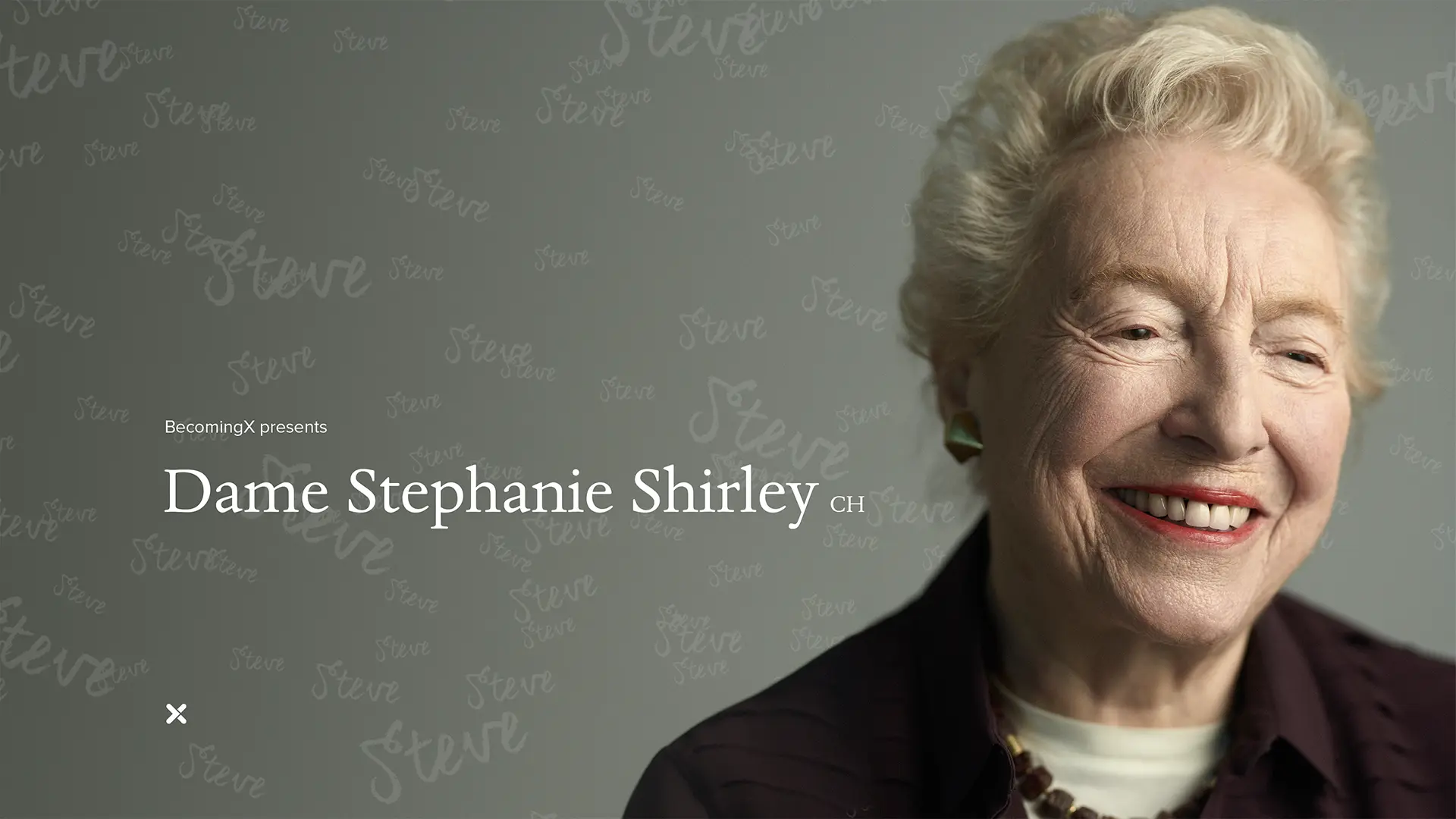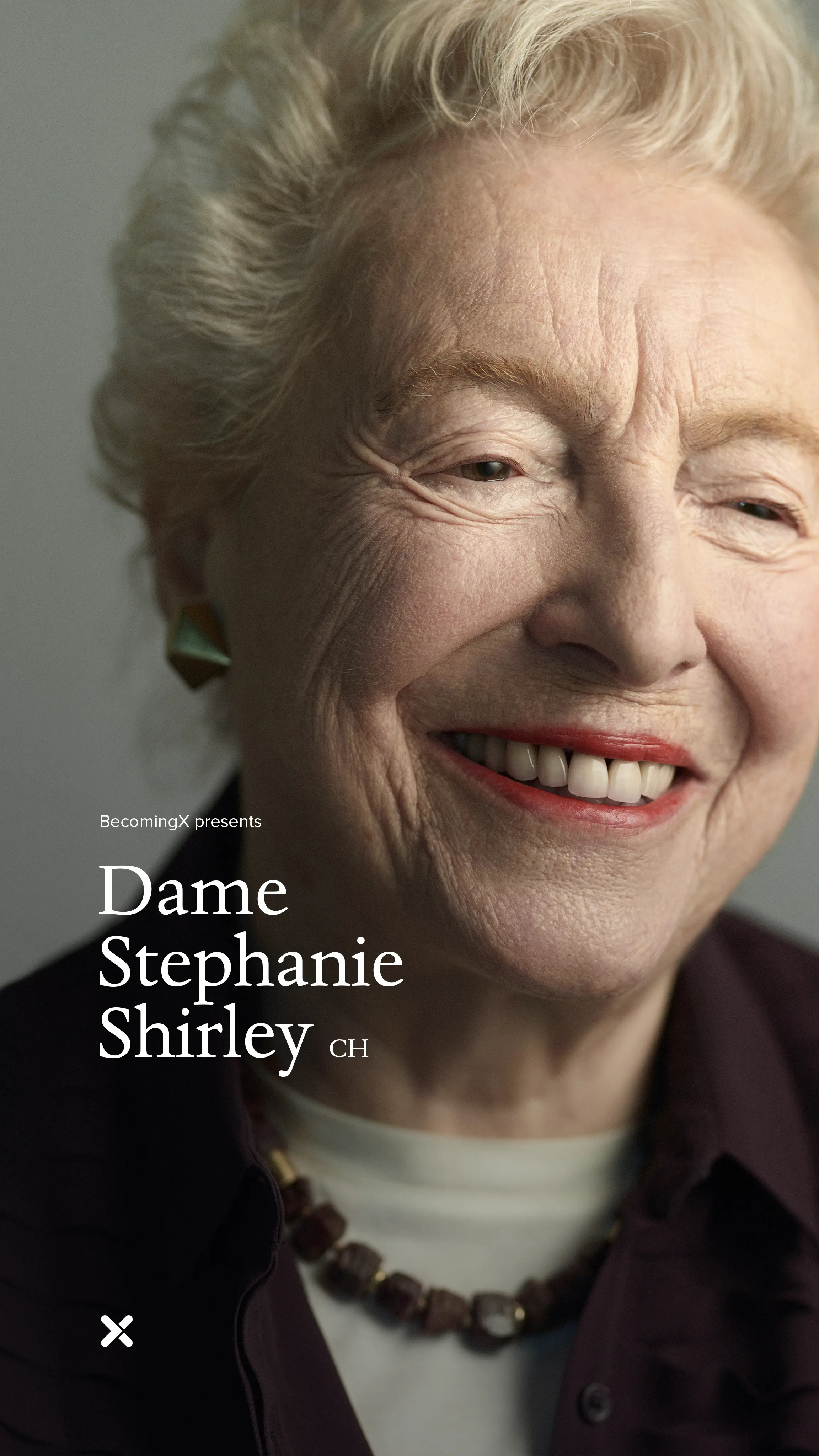

At just 5 years old Stephanie Shirley was put on a Kindertransport rescue train with her sister and sent to England. Born in Germany in 1933, the rise of Hitler meant it was no longer safe for her and her Jewish family. 5 years old and moving to a different country. Different language. Different home. Different parents. Different everything.
Yet she knew she was one of the lucky ones. Lucky to be alive. And from an early age Shirley used that as her drive, her motivator when things got tough. In her words, she was going to lead a life worth saving.
Shirley had a passion for mathematics but fell in love with computing when she joined a small computing company in her early career. What she didn’t love however was the patronisation she faced as a woman in the workplace. She had enough of the sexism and decided to set up her own family-friendly, flexible organisation that would support women. Despite early hurdles and even having to sign letters under a masculine name, “Steve”, to make sales, Shirley’s company grew and grew… From an initial investment of just £6 she created a multi-billion pound technology company that pioneered remote working and transformed the perception of women in business.
Outside her professional life, Shirley was also navigating the challenges of raising an autistic son. He inspired her to set up a charity focussed on helping others with autism and it is one of her proudest achievements. She has now given away most of her wealth to this and the IT charities she founded.
Shirley emphasises the importance of diversity in role models to show us what is possible, what we can achieve. She continues to inspire others to pursue their passions and make a difference.
“My advice to a young person today is really to focus on something that they are interested in, to make an impact on the world.”
Dame Stephanie Shirley – video transcript
The whole direction of my life has gone from being a refugee and having an autistic child, and those have been the two real drivers.
Well, I come from a fairly bourgeois family in Western Germany. And my father was a judge when Hitler came to power. Because he was Jewish, he lost his job and we started moving around Europe trying to find a safe place. It was not a good time to be Jewish. My mother then did a very brave thing. She organised for my sister and I to be put on a so-called Kindertransport rescue train. I think it was the most traumatic thing that can happen to any child. Five years old, not understanding what was going on, moving to a new country with different language, different parents, different everything, I was so disoriented.
When I got to England, a lot of well-meaning people, said to me, five-year-old, "Aren't you lucky to be alive? Aren't you lucky to be alive?" And indeed I was, I was lucky to be alive and I got this feeling that I needed to justify my existence, justify my survival. And so pretty early on, I got this rather priggish, I am going to lead a life that was worth saving and that has driven my life. It continues to be active and live and as strong today as it was 85 years ago.
I think I always wanted to be a mathematician. And at the age of 18, I started off as a sort of mathematical clark, I was pounding at a desk calculator doing calculations. And marriage shortly afterwards, and joined a small computing company. I just fell in love with computing, it was absolutely absorbing. I could not believe that I should be paid so well for something that I enjoyed so much. It was a wonderful thing to happen to me.
Having been patronised as a Jew. I've then found it extremely difficult to be always patronised as a woman. You fight back a bit, you learn to ignore things, you make a joke of it but eventually it does get to you. Really almost overnight I decided I've had enough of this sexism. I really can't stand it anymore. I am going to try and set up an organisation that is the sort of organisation that I would like to work with. Family-friendly, flexible to the extreme, ambitious.
I really knew nothing at all about business but I did find that I had some sort of flare for it. And it grew from just me doing the work, then five or six people. Eventually it grew to 8,500 people. And for years, we dissembled and disguised the fact that it was part-time women working from home.
My idea of selling was to write lots of letters to companies that were advertising for programmers and got absolutely no reply whatsoever. It irritated me, it made me more aggressive. It made me more, you know, I jolly well show them that I can do it. And also I felt all the time that I was doing this for women in general, not just for me. I needed to survive in that big male environment, but I also needed to make it an environment suitable for everybody.
My dear husband suggested actually that maybe, it is that double feminine of Stephanie Shirley that was putting people off and suggested that I started just signing those letters as, Steve Shirley and surprise, surprise, it had some impact, and I've been Steve ever since.
A little boy arrived and suddenly we had to really refocus our lives, our plans. And Giles was a placid, very easy baby. But then at two and a half years old, he turned to being a wild, unmanageable toddler. He was profoundly autistic. He never spoke again. He lost his speech. And the family became autistic in a way because there were so many things that we couldn't do and didn't do.
What we did do was eventually, rear a child that spent 11 years in an asylum. But I did get him out and we set up our first charity and he finished up leading a quiet, dignified life in the community and I'm enormously proud of that.
So my first charity now looks after 300 people modelled on my Gilesy. Most important things that you do in life do not happen quickly. Took me 17 years to get that charity up and running and independent of me. I'm enormously proud of it.
As a refugee, I was consumed by survivor guilt, depression and it's only by starting in the philanthropic world have I been able to let that rancour go. I was very keen to get the company into the hands of the staff. That was the biggest gift I have ever given, a quarter of the company at no cost to anyone but me. We eventually floated. And at our peak value, we were worth $2.8 billion. It made a tremendous difference to many people's lives. I'm very, very pleased that 70 of the team did become a Sterling millionaires.
My advice to a young person today is really to focus on something that they are interested in, to make an impact on the world. It is so, so satisfying and worthwhile. You can't be what you don't see, whether you're disabled or autistic or epileptic or old or young. We need all these skills and we need role models to show that it can happen. Success now means to me that I've got choices to what I do, who I spend time with, how I spend my life, the rest of my life. And I hope it is to continue to lead a life that's worth saving.
END CARD
Stephanie Shirley became a groundbreaking technology entrepreneur, philanthropist and an icon for gender equality.
Starting out in 1962 with an investment of just £6, she created a multi-billion pound technology company that pioneered remote working and transformed the perception of women in business.
She received a Damehood in 2000 and became a Companion of Honour in 2017, an award held by only 65 living people.
She has now given away most of her wealth to the autism and IT charities she founded, helping demonstrate that her life was indeed worth saving.